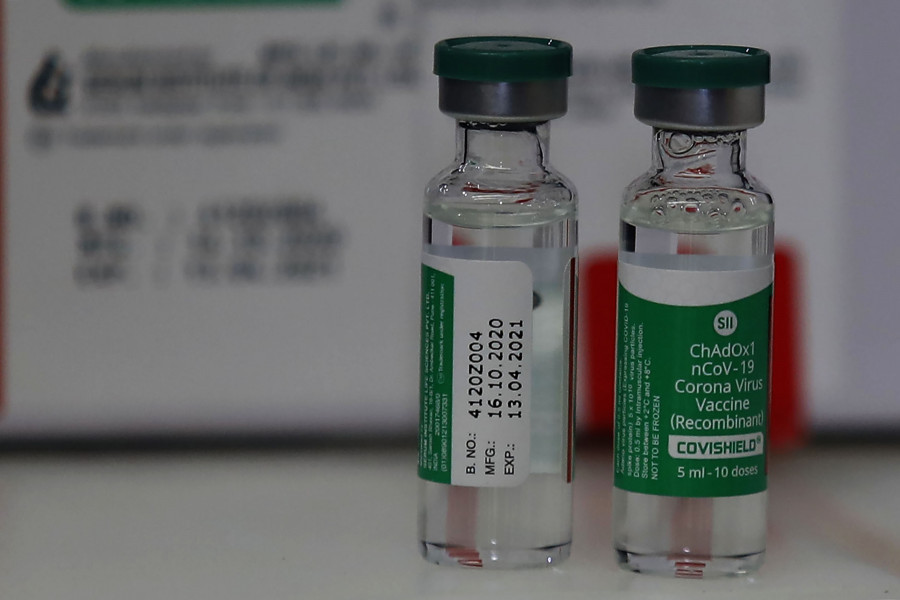Health
Health Ministry plans to purchase 5 million Covishield doses from India
Ministry sent a proposal to Serum Institute of India asking the vaccine manufacturer to sell the vaccine directly to the government. Health Minister Khatiwada also requested the Indian ambassador to facilitate the purchase.
Arjun Poudel
The Ministry of Health and Population has been planning to purchase an additional 5 million doses of Covishield vaccine from the Serum Institute of India.
For that the ministry has sent a proposal to the vaccine manufacturing company requesting it to sell the jabs directly to the government.
“We have already sent a proposal to the vaccine manufacturing company to sell 5 million doses of Covishield directly to the government,” Health Secretary Dr Roshan Pokhrel, told the Post. “Like in the past, we want to procure vaccines directly from the vaccine manufacturing company.”
Earlier in February, the Health Ministry had purchased 2 million doses of Covishield from the Serum Institute of India, at $4 per dose.
The Health Ministry later tried to purchase an additional 5 million doses, but the Indian firm refused to sell at the same price it sold earlier.
The Health Ministry was even ready to pay an additional amount for the vaccine but when the second wave of infections hit India, which infected hundreds of thousands of people and killed thousands, authorities in India restricted the export of Covid-19 vaccine.
As a result Nepal’s plan to purchase 5 million doses was unsuccessful.
Moreover, the vaccine manufacturing company could not deliver the vaccine doses, for which Nepal had made payment in advance.
Of the 2 million doses, the vaccine manufacturing company supplied 1 million doses on February 21 and had committed to supply the remaining 1 million doses within 10 days.
The remaining 1 million doses were delivered on October 9 only.
Due to delay in supplying the remaining doses on time, around 1.4 million elderly people over 65 years old, who had taken the first doses of Covishield vaccine between March 7 and 15, had to wait for months for the second dose. After Bhutan and Japan supplied AstraZeneca vaccine, second doses were administered to the elderly.
Bhutan had supplied 230,000 AstraZeneca doses and Japan supplied 1,614,740 doses of the vaccine in August.
A few days ago, Minister for Health and Population Birodh Khatiwada in his meeting with Indian ambassador Vinay Mohan Kwatra told him that the government wants to purchase 5 million doses of Covishield and asked him to facilitate the procurement.
“The Indian ambassador has assured help,” said Health Secretary Pokhrel.
Apart from the 2 million doses of Covishield purchased from India, Nepal had earlier purchased 10 million doses of Vero Cell vaccine with Chinese vaccine manufacturing company Sinopharm through a non-disclosure agreement.
The government has also purchased over 9.9 million doses of Covid-19 vaccine from China and the United States through the COVAX facility’s cost-sharing scheme.
Of them, the facility has already delivered 1.02 million doses of Vero Cell vaccine to the country.
Nepal needs to vaccinate around 78 percent of its 30 million population—or around 25 million people, as per the government’s new plan that also includes those aged between 12 and 18 years. Earlier, the government had planned to vaccinate only those aged 15 years and above.
Since around 4-5 million people are said to be living abroad, the government needs to vaccinate around 19-20 million people. For this, the country needs a little over 40 million doses of double-shot vaccines.
Nepal had launched its Covid-19 vaccination campaign on January 27 with the 1 million doses of Covishield, the AstraZeneca type vaccine manufactured by the Serum Institute of India.
Altogether, the country has received 20,179,810 doses of Vero Cell, AstraZeneca, Janssen and Pfizer-BioNTech vaccines.
As of Wednesday, 7,381,202 people (24.3 percent of the total population) have been fully vaccinated, according to the Health Ministry.




 11.84°C Kathmandu
11.84°C Kathmandu















